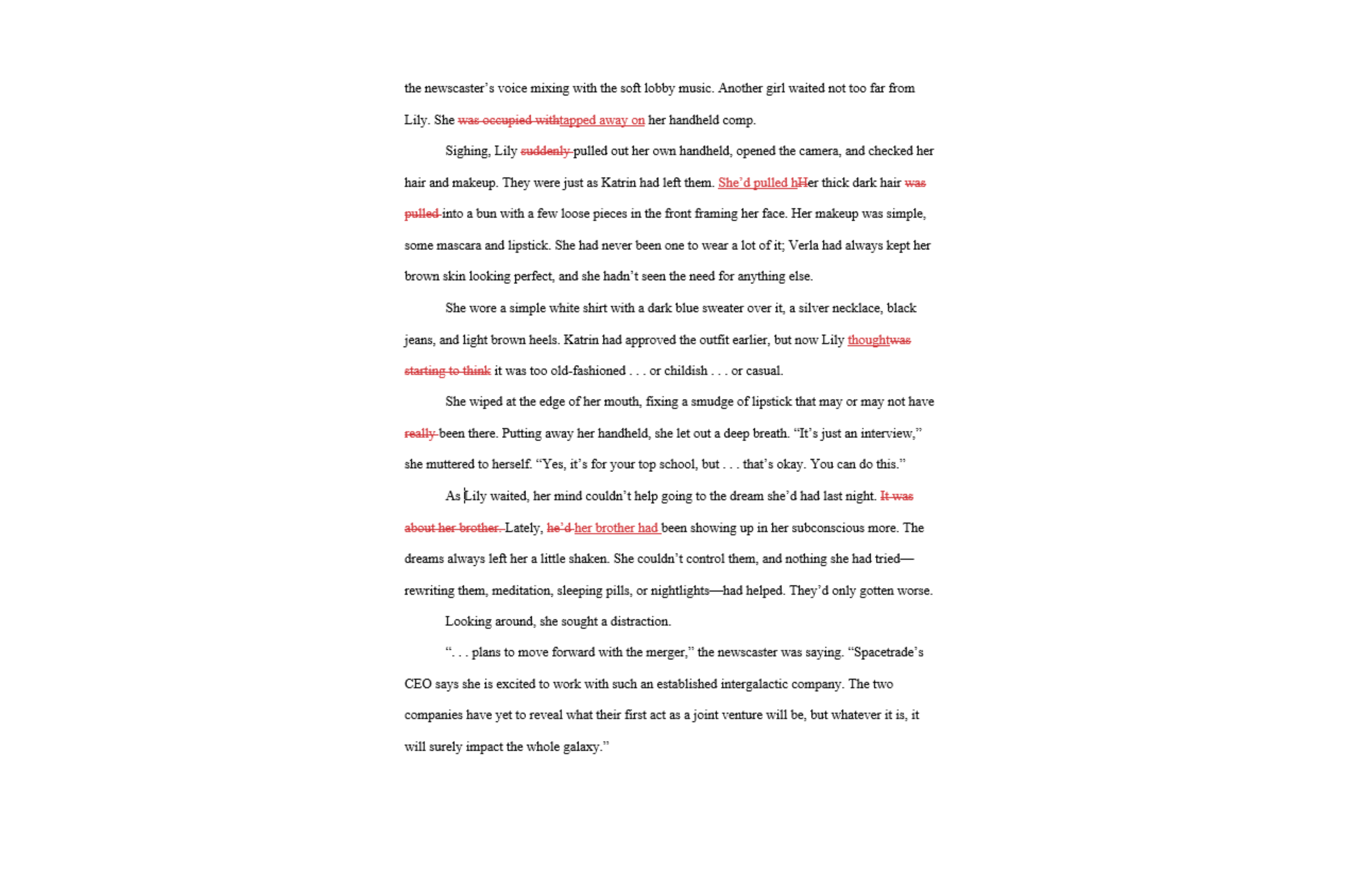Let’s face it. We all seem to use filler words, passive voice, and weak verbs, adverbs, and adjectives in our writing. But these words and phrases can be really hard to spot when you’re editing your story, and they don’t improve your writing. Sometimes they just slip in, but they’re definitely not necessary all the time.
If you’ve glanced down at the list, you can see what I’m doing here. Let’s try that again.
Let’s face it. We all use filler words, passive voice, and weak verbs, adverbs, and adjectives in our writing. These words and phrases are hard to spot when you’re editing, and they don’t improve your writing. They slip in, but they’re often not necessary.
Isn’t that better?
That first paragraph feels clunky. There’s so much unnecessary filler: seem to, can be, really, just, definitely, all the time. None of these words and phrases add value.
Whenever I’m line or copy editing for a client or for myself, I keep an eye out for these words. When I spot them, I delete them. They cloud the prose, but when I remove them, the writing becomes sharper and clearer.
If you’re wondering how to improve your writing skills or decrease your word count, here are 10 words and phrases to search for and cut.
1. Start/Begin
This is one of my biggest pet peeves. Start to and begin to cause the verb after them to be so weak!
Unless the action is interrupted, these words just delay the verb.
Let’s compare.
Before
“He’d gotten into the habit of fiddling with the ring whenever he started to think about her, which was a lot more than he cared to admit.”
“He stepped out of the hole and began to fill it in without a word. He didn’t look at the bodies as he did.”
After
“He’d gotten into the habit of fiddling with the ring whenever he thought about her, which was a lot more than he cared to admit.”
“He stepped out of the hole and filled it without a word. He didn’t look at the bodies as he did.”

2. Seem
Honestly, this one is often the result of lazy writing. A character might seem angry, but how does the narrator know? Their body language and actions.
Seem can be used when something is uncertain, but if it’s not uncertain, why make it seem like it is?
Let’s compare.
Before
“The rest of the hunting party seemed to perk up at the mention of water.”
“His eyes were drawn to her wrists, the glass inset in her cuffs seemed to radiate power as the mini rainstorm filled his waterskin.”
After
“The rest of the party straightened at the mention of water.”
“His eyes were drawn to her wrists, the glass inset in her cuffs radiated power as the mini rainstorm filled his waterskin.”
3. Suddenly
Another one of my pet peeves: suddenly. This word is seldom needed. In fact, most of the time it delays the action or event that is supposed to be sudden.
Let’s compare.
Before
“Tears formed in her eyes as she was suddenly taken back to a thousand memories of her brother.”
“He was about to step past them, but suddenly, the guard with the knife lunged forward.”
After
“Tears formed in her eyes as she was taken back to a thousand memories of her brother.”
“He was about to step past them, but the guard with the knife lunged forward.”
4. Wonder/Think/Remember/Feel/Realize
Whether you include these words depends on the point of view (POV) you’re writing in and how deep you want that to be. The deeper the POV, the less you need these. But if you want some distance between the reader and the POV, then you might consider keeping them.
These words tend to delay and weaken whatever thought or feeling the character is experiencing.
Let’s compare.
Before
“He pulled out his flute. He wondered if it had survived solely for this moment.”
“And then what would he do? He felt that he couldn’t go back to his lone adventuring on the planet. He’d done everything here already.”
After
“He pulled out his flute. Had it survived solely for this moment?”
“And then what would he do? He couldn’t go back to his lone adventuring on the planet. He’d done everything here already.”
5. Extra Dialogue Tags
Dialogue tags are tricky. You want to make sure readers know who is speaking and their tone, but too many dialogue tags add a lot of clutter to a conversation.
But readers can often follow conversations with fewer dialogue tags than you’d think, especially if only two characters are speaking to each other.
In many of my clients’ books, I see dialogue tags with every line of dialogue and when there is also an action tag. To improve your writing, keep in mind you don’t need a tag on every piece of dialogue, and you don’t need a dialogue tag when the character is also doing some kind of action.
Let’s compare.
Before
“You interview every student at the university?” Lily asked.
“Only for the College of Fine Arts and only for my sector, but yes,” Viviano said. “I like to get to know my students, and this is the only way to do it.” She leaned forward and pressed a button on her desk, which turned its surface into a screen. She pulled up a few documents, and Lily recognized her application papers and portfolio. “You were homeschooled as a child?”
Lily nodded. “That’s correct,” she said.
“How did you like homeschooling?” Viviano asked.
Lily swallowed. “I don’t really know anything different. I think I got the best education I could in my circumstances, but obviously, it’s not as good as I would get here,” she added.
Viviano nodded. “University-level education would be good for you. It’s difficult to succeed on a planet like Akyri without it,” she said, sweeping through a few of the documents, then leaning back in her chair. “I want to know more about you. Tell me about yourself, Lily.”
After
“You interview every student at the university?” Lily asked.
“Only for the College of Fine Arts and only for my sector, but yes. I like to get to know my students, and this is the only way to do it.” Viviano leaned forward and pressed a button on her desk, which turned its surface into a screen. She pulled up a few documents, and Lily recognized her application papers and portfolio. “You were homeschooled as a child?”
“That’s correct.”
“How did you like homeschooling?”
Lily swallowed. “I don’t really know anything different. I think I got the best education I could in my circumstances, but obviously, it’s not as good as I would get here.”
“University-level education would be good for you. It’s difficult to succeed on a planet like Akyri without it.” Viviano swept through a few of the documents, then leaned back in her chair. “I want to know more about you. Tell me about yourself, Lily.”
6. Very/Really
There’s not much to say about these, other than they really don’t add anything to your writing—sorry, I mean they don’t add anything to your writing.
They also make it easy to use weak verbs, adjectives, and adverbs, which don’t improve your writing.
Let’s compare.
Before
“Look, I’m really tired, and I don’t really want to talk right now. I’m assuming you’re far away from the ship, so you can sleep on the couch if you want.”
“I’ve been doing this since I was nine, which was a very long time ago now that I think about it.”
After
“Look, I’m tired, and I don’t want to talk right now. I’m assuming you’re far away from the ship, so you can sleep on the couch if you want.”
“I’ve been doing this since I was nine, which was ages ago now that I think about it.”
7. Is/Was
You’re probably thinking, “How am I supposed to write without using is or was?” This seems like an odd one, but it’s possible—at least some of the time. Especially for is/was [verb]ing (like she was typing) and there is/was. When you use is or was, you tell instead of show, and you take the action out of your writing.
Often the verb you need, the verb that you want to be strong, is already in your sentence. You just need to rearrange the words a bit.
Let’s compare.
Before
“James wore a long-sleeved shirt that covered most of the tattoos on his arms. His face was full of sharp angles, and a grin always hid beneath his expression, like everything was amusing to him.”
“‘College is where you go to find yourse—’ There was a commotion on the other line as she cut off.”
After
“James wore a long-sleeved shirt that covered most of the tattoos on his arms. Sharp angles filled his face, and a grin always hid beneath his expression, like everything amused him.”
“‘You go to college to find yourse—’ A commotion on the other line cut her off.”
8. Just
For whatever reason, this word is a hard one for me to let go of. You’ll probably find it throughout this article. But just doesn’t add much to any sentence. I like it, but it just doesn’t improve your writing.
If you’re trying to write realistic dialogue, you can get away with it some of the time (most of the words and phrases on this list are used in speech all the time). But if you can remove it from a sentence without changing the meaning, then you should (as with the rest of the words and phrases on this list).
Let’s compare.
Before
“She looked at him, as if she needed his approval. Their group had never sought his approval before, but perhaps she was just trying to ease the tension.”
“Eventually, he went back outside to where she and James waited. They looked at him expectantly, but he just shook his head.”
After
“She looked at him, as if she needed his approval. Their group had never sought his approval before, but perhaps she was trying to ease the tension.”
“Eventually, he went back outside to where she and James waited. They looked at him expectantly, but he shook his head.”
9. Definitely/Probably/Actually/Basically
These words, and other -ly words like them, rarely add meaning to a sentence or improve your writing. In most situations, you can simply cut them.
Let’s compare.
Before
“We should probably post someone outside the door too.”
“We know how to protect people like you. Despite kidnapping you, we’re actually good people.”
After
“We should post someone outside the door too.”
“We know how to protect people like you. Despite kidnapping you, we’re good people.”
10. Down/Up
People often pair down and up with words that carry all the meaning by themselves, making up and down redundant—sat down, stood up, etc. Why increase your word count when these words aren’t adding anything?
Let’s compare.
Before
“Lily followed her gaze down to the street where a bunch of people were gathered in front of the sector’s capitol building.”
“A light turned on, causing Peter to look back up at the building.”
After
“Lily followed her gaze to the street where a bunch of people were gathered in front of the sector’s capitol building.”
“A light turned on, causing Peter to look back at the building.”
There are, of course, exceptions—times when these words and phrases contribute to the prose and perhaps even improve your writing. Any of these words and phrases used in moderation won’t cloud your work too much. Use your best judgment to decide when these words are necessary.
Happy writing!






One response to “Words and Phrases to Delete to Improve Your Writing”
[…] what exactly is a practice book, how did it take the pressure out of writing and improve my writing, and how can it improve yours? […]